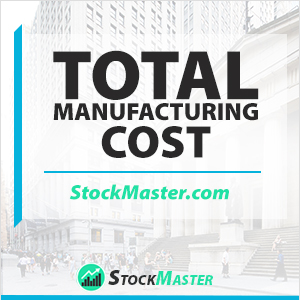 What is Total Manufacturing Cost?
What is Total Manufacturing Cost?
Definition: Total manufacturing costs are all the combined costs that are involved in a business’ manufacturing process. The manufacturing process of every business aims to convert raw materials into products that are ready to be sold to the market. There are many processes involved in manufacturing and notably a lot of costs which are collectively referred to as total manufacturing costs.
It is usually equated to the cost of goods sold within a particular period and this cost is recorded in the expense account of the business. However, companies do not usually sell all their products within the same duration due to lower demand than the produced amount or due to surpluses.
For this reason, the total manufacturing cost is split into the cost of making the goods sold in a specific duration and also the cost of inventory.
Components of Total Manufacturing Cost
Despite the above two situations, the main focus is usually on the total manufacturing cost as the cost of goods sold, and not those that are still in inventory. There are three key aspects that are important especially when calculating the total manufacturing cost of a business as shown below.
- Direct labor- this is the sum of the direct costs involved especially manufacturing labor that is part of the manufacturing process during a specific duration.
- The direct material costs are the costs that the company incurs while sourcing the raw materials used in the manufacturing process. The total cost of direct materials is calculated by subtracting the amount of ending inventory from the starting inventory.
- Overheads- These are the total manufacturing overhead costs that take place over a specific duration. Some of the overhead costs that companies incur include equipment depreciation, rent, salaries, repairs and maintenance costs.
Calculating the Total Manufacturing Cost Formula Calculation
The overheads, direct labor, and direct material costs are collectively the total manufacturing costs of a company. This is the equation used to determine the total manufacturing cost formula.
Direct labor+ firm overheads+ direct materials= total manufacturing cost.
Direct labor costs
A lot goes into making a finished product from raw materials. Production lines are either automated with specialize equipment or there are employees that handle different processes within the production line. The employees play a vital role in the success of the product because it cannot be considered a success without their input.
The employees or workers in the production line have to be remunerated for their services and that is why companies have elaborate payrolls that include their salaries and even retirement funds. It even accounts for payroll taxes and any extra fees that may be involved especially when it comes to direct labor payments. Note that only employees that are directly involved in the production process are accounted for part of direct labor. This means that support staff such as accounting and human resources is not considered as direct labor costs.
Direct material costs
The raw materials that are converted into the final product through a manufacturing or production line are referred to as direct materials. The cost of securing these materials is known as direct material costs. The calculation for direct material costs is as below.
Starting inventory+ added raw materials- closing inventory= direct material costs.
It is important to establish the cost of direct materials, especially for stock-taking purposes. Also, note that there are some materials that are not necessarily part of the direct costs. Good examples include the water that the product line employees drink or water that is used to wash equipment.
Overhead costs
They are a vital part of the production line activities. For example, a plant needs electricity to function and equipment needs to be maintained. Products also have to go through quality inspection and this contributes to the extra costs that are involved in making the product. Note that staff salaries, office rent sales, and administration expenses are not considered as overhead costs. The above three aspects should help demonstrate the role of manufacturing costs in production processes.
